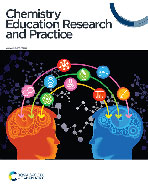Chemistry instructors’ intentions toward developing, teaching, and assessing student representational competence skills
Abstract
Representational competence is one's ability to use disciplinary representations for learning, communicating, and problem-solving. These skills are at the heart of engagement in scientific practices and were recognized by the ACS Examinations Institute as one of ten anchoring concepts. Despite the important role that representational competence plays in student success in chemistry and the considerable number of investigations into students’ ability to reason with representations, very few studies have examined chemistry instructors’ approaches toward developing student representational competence. This study interviewed thirteen chemistry instructors from eleven different universities across the US about their intentions to develop, teach, and assess student representational competence skills. We found that most instructors do not aim to help students develop any representational competence skills. At the same time, participants’ descriptions of their instructional and assessment practices revealed that, without realizing it, most are likely to teach and assess several representational competence skills in their courses. A closer examination of these skills revealed a focus on lower-level representational competence skills (e.g., the ability to interpret and generate representations) and a lack of a focus on higher-level meta-representational competence skills (e.g., the ability to describe affordances and limitations of representations). Finally, some instructors reported self-awareness about their lack of knowledge about effective teaching about representations and the majority expressed a desire for professional development opportunities to learn about differences in how experts and novices conceptualize representations, about evidence-based practices for teaching about representations, and about how to assess student mastery of representational competence skills. This study holds clear implications for informing chemistry instructors’ professional development initiatives. Such training needs to help instructors take cognizance of relevant theories of learning (e.g., constructivism, dual-coding theory, information processing model, Johnstone's triangle), and the key factors affecting students’ ability to reason with representations, as well as foster awareness of representational competence skills and how to support students in learning with representations.


 Please wait while we load your content...
Please wait while we load your content...